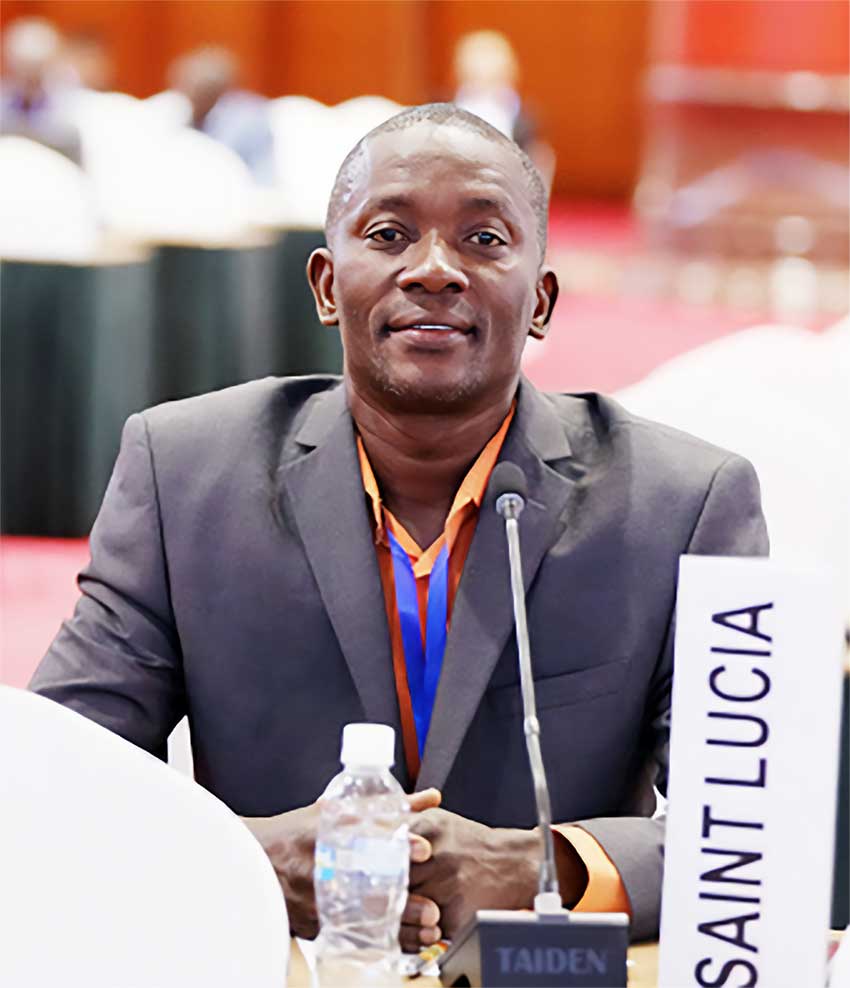
Agriculture and Forestry Minister Alfred Prospere is exhorting the conservation, protection and restoration of the island’s forests.
According to the minister, this is undeniably critical to safeguard and promote human health, manage climate change and biodiversity loss. Prospere said this much in a speech on March 21 (International Day of Forests).
The United Nations’ General Assembly proclaimed March 21 as International Day of Forests in 2012 to celebrate and raise awareness of the importance of all types of forests. Countries are encouraged to undertake local, national and international efforts to organize activities involving forests and trees, such as tree planting campaigns.
This year’s theme (“Forests and health”) highlights the essential linkages between forests, nutrition and food security.
“As many of us already know, the purpose of International Day of Forests is to celebrate and raise awareness of the important role of all types of forests and trees… as a vital source of food and nutrition, as a form of protection from diseases… combating the biggest threats of humanity… supporting national developments and preserving the natural environment,” Prospere said.
He added that “there seems to be a growing interest in understanding the role and interconnections between the forest and human health, in addition to the food, fuel and fibre provided by forests that supports people’s health and wellbeing… forests also act to regulate water cycles and filter air pollution that indirectly but substantially affects human health.”
According to the minister, forests provide services that are extremely important and thus must be cared for.
“All our communities are supplied with fresh water that emanates from the filtering process of our forests. The hotels, the business places, our agricultural farms and our homes are supplied with fresh water from the rivers that spring out of the forest areas,” Prospere said adding that the “furniture in our homes, (a) significant amount of the medicine sold in our pharmacies are derived from plant-based materials but so often we take all these free services for granted.”
Furthermore, he noted, “the forest serves as a sanctuary for individuals and groups.”
Said Prospere, “We cannot avoid recognizing the ecosystem services generated by the forests are always totally absent from our national accounting books and that our forest ecosystems continue to face threats of being destroyed. This is a situation we must counteract and we must take steps to prevent from happening. I must also take this opportunity to observe the tremendous efforts of those before us who worked with heart and soul to safeguard this indispensable resource.”
Presently, he noted, “we still have about 35 percent of the entire island covered with natural forests, 45 percent of which is declared forest reserve… the other 55 percent of which is under private ownership.”
The Forestry Department is the main agency responsible for managing forest reserves on island and continues to ensure that this important resource is guarded.
“We continue to look for ways to further expand our forests and prevent the destruction of existing forests,” Prospere said.
Through a ten-year strategic plan, the Forestry Department continues to spend significant resources on reforestation, agroforestry programmes, surveillance and forest protection activities and education and awareness.
The plan outlines four main areas for effectively managing forest resources and wildlife across the island, namely, maintaining healthy ecosystem and thriving species, ensuring sustainable flows of products that support local economies and conservation of biodiversity, protecting water supplies, soils and coastal zones, ensuring resilience to climate change, and promoting visitation, enjoyment and cultural and spiritual enrichment.
“We as Saint Lucians are endowed with very important forest resources that provide environmental, social and economic benefits. The wise use of our forest resources is essential if their multiple values are to be maintained and enjoyed not only by us, but also for the benefit of future generations,” Prospere said.
“I therefore urge everyone to commit themselves to reducing deforestation, preventing forest degradation and promoting sustainable livelihoods through forest-smart actions that address resilience, adaptation and mitigation issues,” he added.
“Forests are often called the lungs of the planet because they absorb harmful carbon dioxide and produce life-giving oxygen so it’s no exaggeration to equate healthy forests with healthy people,” the United Nations (UN) pointed out in an article.
Covering 31 percent of earth’s land and providing a home to 80 percent of all land-based species, forests are crucial to human health and well-being, but their loss across the planet is threatening people everywhere.
“Forest ecosystems keep the planet healthy by regulating the climate, rainfall patterns and watersheds and crucially provide the oxygen which is essential to human existence. Healthy forests help to keep climate change in check by acting as ‘carbon sinks’, which annually absorb about two billion tonnes of carbon dioxide, the gas which is contributing to climate change and the increase of temperatures globally,” the UN noted, adding that the rapidly changing climate is threatening the very existence of people in many different ways: through death and illness due to extreme weather events, the disruption of food systems, and the increase in diseases.
Simply put, without healthy forests, people around the world, especially in the world’s most vulnerable countries, will struggle to lead healthy lives and maybe even to survive.
Here’s another point to consider according to the UN:
“Forest products are used around the world every day. As many as 80 percent of developing nations and one quarter of developed countries depend on plant-based medicinal drugs. Forests contain about 50,000 plant species used for medicinal purposes by both local communities and multinational pharmaceutical companies.”
For millennia, forest dwellers have treated a range of ailments using products they have harvested. At the same time, many common pharmaceutical medicines are rooted in forest plants, including cancer-treating drugs from the Madagascar periwinkle and malaria medication, quinine, from cinchona trees.
The One Health approach, launched as part of the UN’s response to the COVID-19 pandemic, recognizes that the health of humans, animals, plants, and the wider environment, including forests, are closely linked and interdependent.
The UN also noted that “nearly one billion people globally depend on harvesting wild food such as herbs, fruits, nuts, meat and insects for nutritious diets. In some remote tropical areas, the consumption of wild animals is estimated to cover between 60 and 80 percent of daily protein needs.”
A study from 43,000 households across 27 countries in Africa found that the dietary diversity of children exposed to forests was at least 25 per cent higher than those who were not.
In 22 countries in Asia and Africa, including both industrialized and developing countries, researchers found that indigenous communities use an average of 120 wild foods per community, and in India, an estimated 50 million households supplement their diets with fruits gathered from wildland forests and surrounding bushland.
Also important to note, the UN stated, is the fact that forests provide goods and services, employment, and income to perhaps 2.5 billion people worldwide— that’s around one third of the global population.
The UN made it clear that “keeping forests and humans healthy is also at the heart of sustainable development and the 2030 Agenda.”
The wide-ranging benefits of forests are well known, but that doesn’t mean they are offered the protection that they perhaps deserve, the UN pointed out.
Fire, insect-damage and deforestation have accounted for up to 150 million hectares of forest loss in certain years over the last decade; that’s more than the landmass of a country like Chad or Peru. The production of agricultural commodities alone, including palm oil, beef, soy, timber, and pulp and paper, drives around 70 per cent of tropical deforestation.
“Many governments have adopted forest-friendly policies, and others have increased investment in woodlands and trees. Local communities and actors are making their own strides, sometimes one tree at a time. The UN established the Decade for Ecosystem Restoration (2021-2023) and its agencies are harnessing partnerships with local to global stakeholders to better protect forests,” the UN indicated.
Established in 2008, UN-REDD is the flagship UN knowledge and advisory partnership on forests and climate, supporting 65 partner countries. Building on the expertise of the UN Environment Programme (UNEP), UN Development Programme, and the Food and Agriculture Organization (FAO), the initiative has, among other things, seen member countries reduce forest emissions “at levels equivalent to taking 150 million cars off the road for a year, ushering in a lot more fresh air.”
President of the UN Economic and Social Council, Lachezara Stoeva, speaking at an event marking the International Day on Tuesday, said that “sustainably managed forests hold the key to our healthy recovery from the multitude of crises we face currently and strengthen our resilience to withstand future crises. Regardless of how you define health, be it physical, mental, or spiritual – forests have a role to play.”












